Magnesium is a micronutrient that’s responsible for over 350 metabolic functions, including energy production, muscle repair, gene maintenance and nervous system functioning (1).
Unfortunately, magnesium is the most common mineral deficiency in North America which makes supplementation all that more important. About 40% of the magnesium in your body is found in muscles, soft tissues and fluids while the remaining 60% is concentrated in your skeleton (2).
Rankings
1. Essential Elements Magnesium Plus Zinc With D3
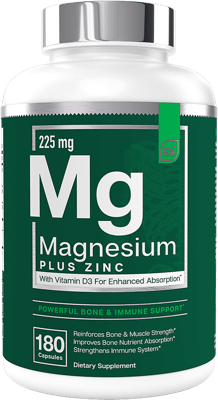
Essential Elements Magnesium combines magnesium malate, glycinate, and citrate with vitamin D3 and zinc to provide one of the most potent and bioavailable magnesium supplements on the market. This helps to boost your immune system while also promoting deep sleep.
It contains no common allergens and every batch is third-party lab tested to ensure purity. With a long list of positive reviews, we can whole-heartedly say this is Healthtrends #1 magnesium supplement.
2. Nuzena Magnesium Pure+
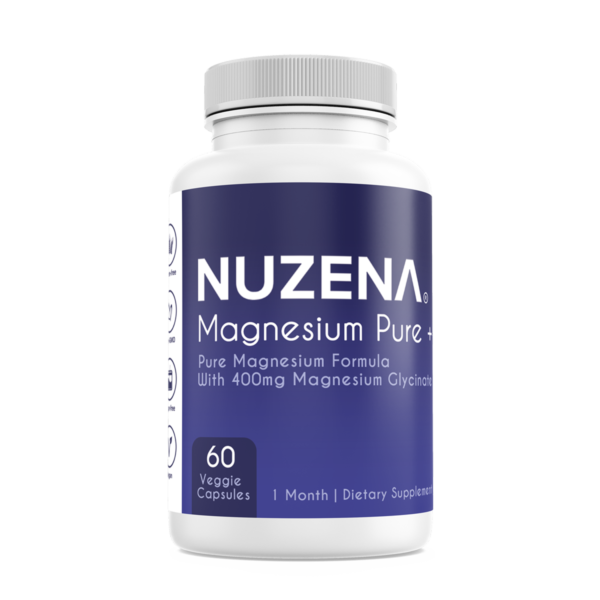
Magnesium Pure+ by Nuzena contains a standard dosage of 400mg of magnesium glycinate. We’ve seen similar dosages in other magnesium supplements on the market; however we find Nuzenas’ attention to product quality and customer experience really sets them apart from the rest of the products on this list.
Nuzena has registered dieticians on hand, quality certification, and real-time quality reports, alongside their product formulas being non-GMO, gluten-free, and vegan-friendly.
3. TransparentLabs RawSeries Magnesium Bisglycinate
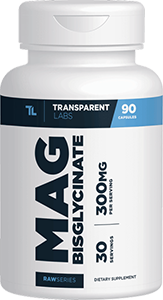
TransparentLabs Magnesium Bisglycinate is free of artificial sweeteners or coloring, and preservatives. It’s also non-GMO, and gluten-free; making this supplement one of the cleanest and most potent magnesium supplements available on the market.
Scientific studies show the Magnesium Bisglycinate can be thoroughly used in the body unlike other supplement alternatives.
4. Metagenics Mag Glycinate
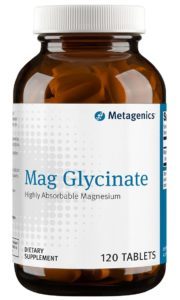
The magnesium glycinate used in Metagenics more absorbent than supplements that use magnesium oxide and are generally well-tolerated.
Each tablet is fairly standard at 100 mg of magnesium and includes cellulose, stearic acid, and croscarmellose sodium to name a few. Additionally, Metagenic commits itself to use ingredients that have been scientifically tested and established in terms of both benefit and bioavailability.
5. Pure Encapsulations Magnesium Glycinate

Each capsule comes with 128 mg of magnesium alongside cellulose to increase bioavailability. Additionally, Pure Encapsulations uses a vegan, vegetarian, non-GMO, and gluten-free formulation that makes it ideal for multiple lifestyles across the board.
Though it does not come with a slew of vitamins and does put a heavy emphasis on the magnesium directly, this is no way diminishes its potency.
6. NOW Magnesium Citrate
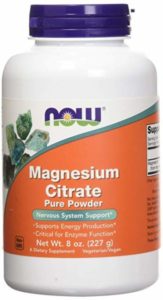
NOW Magnesium Citrate comes in a loose powder form that has both a high absorption rate and a tart taste making it an easy component to add in drinks or meals as preferred. The serving size is based largely on preference as the amount used will vary from person to person.
The minor drawback to this supplement is the need for a micro-scale.
7. Doctor’s Best High Absorption Magnesium

Doctor’s Best formulation includes 100mg of magnesium in each tablet which can easily be split into multiple smaller doses if needed. With its chelated magnesium, the body will be more readily able to absorb the magnesium as needed.
This supplement also contains cellulose and stearate to act as binders. While this does not make for the most simplistic of products, it does make it one of the most effective.
8. Life Extension Neuro-Mag Magnesium
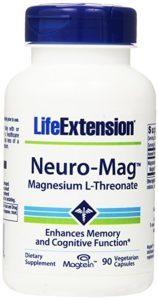
With its use of the lesser-known magnesium L-Threonate, Life Extension’s magnesium supplement stands out from the rest of the magnesium supplements on the market.
This lower dosage makes it less than ideal for a few specific groups looking to supplement magnesium intake. It is, however, a prime choice for those who want a much more focused supplement with a clean formulation and a simple approach.
9. Natural Vitality Calm Magnesium

Though their gummy version did not make our rankings list, Natural Vitality’s powder magnesium proved to be significantly better. The powder form allows for extra versatility in terms of use while providing a massive dose of magnesium (350 mg) per scoop.
The only minor drawback is its use of Magnesium carbonate which may not be as easily absorbed, however, this is a very small issue in an otherwise solid supplement.
10. Jigsaw Health Magnesium with Slow Release
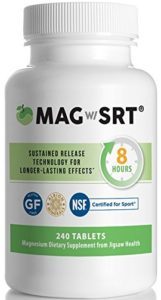
Those looking for a multivitamin solution may find Jigsaw Health’s formulation to be a good fit. In addition to 125 mg of magnesium, each tablet includes vitamin C, vitamin B6, folic acid, and vitamin 12 to name a few.
If you happen to have multiple deficiencies or health goals, this may be just the one-stop solution you’re looking for.
11. Zhou Mag Glycinate
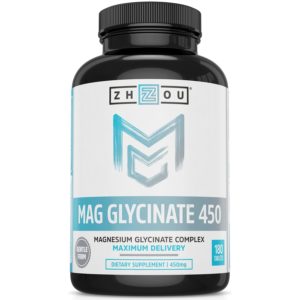
Zhou’s Mag Glycinate supplement comes with a vegan and vegetarian-friendly formulation with no artificial products.
A great choice for those looking for simplicity.
How We Rank
For our magnesium supplement rankings, we placed a large emphasis on a few specific elements. Since magnesium should often be taken in smaller doses several times a day, we looked for supplements with dosages that were easily adjustable. Though 100 mg is an ideal dosage amount when planning on separating or splitting doses, higher amounts did not exclude the supplement from the rankings. A key element here was to make sure the dosage amount was neither too high nor too low. While doses that are too low will not provide substantial health benefits, those that are too high will not be adequately absorbed in the body.
We also chose to eliminate products that only provided magnesium with trace materials. This eliminated several products, including bestsellers, such as Solaray’s calcium and magnesium supplement. Multiple trace materials can make dosage division difficult as the other ingredients must also be accounted for during the process.
Next, we reviewed the delivery form of the available magnesium supplements. Those that water-soluble such as magnesium citrate were ranked higher than those that were insoluble. Water-soluble magnesium avoids stress on the digestive system and absorbs more easily than insoluble forms such as magnesium oxide. This means you will ultimately get true value from your supplement.
Lastly, we excluded any supplements that had too many artificial sweeteners, fillers, or flavorings. This removed many popular options from consideration such as Natural Vitality Calm Gummies. Supplements that may have had more than one delivery formulation, were reviewed based on the specific merits of each option rather than as a whole, which is why Natural Vitality was still able to make our final list.
Benefits
1. Magnesium helps you fall asleep easier. Magnesium helps activate neurotransmitters that are responsible for turning on the parasympathetic nervous system, the system responsible for getting you calm and relaxed (5).
It also regulates the hormone melatonin, which guides sleep-wake cycles in your body (6).
Other studies have shown that magnesium binds to gamma-aminobutyric acid (GABA) receptors which help to calm down the nervous system. On the flip side, low magnesium levels disrupt sleep (making it even more important to supplement).
2. Magnesium helps improve sleep quality. In 2012 a double-blind, randomized clinical trial was conducted with 46 elderly subjects, randomly allocated into the magnesium or the placebo group, and received 500 mg magnesium or placebo daily for 8 weeks.
Supplementation of magnesium appears to improve subjective measures of insomnia, sleep efficiency, sleep time and sleep onset latency and early morning awakening. The placebo group also showed a lower level of renin and melatonin, two of the bodies’ powerful sleep hormones (7).
Another 2011 study involving 43 elderly patients also demonstrated that magnesium helps improve sleep quality (8).
Lastly, a 1993 study done with mice found that magnesium deficiency caused restless sleep patterns (9).
3. Magnesium can boost exercise performance. A 2014 study published in the Journal of Sports Science showed that volleyball players who supplemented with 250mg of magnesium per day improved their jumping movements (10).
A 1993 study showed that athletes who supplemented with magnesium over 4 weeks reduced stress hormone levels during a triathlon. They also ran, cycled and swam faster at the time of the event (11).
However, the evidence is mixed. Other studies have found no benefit of magnesium supplements in athletes with low or normal levels of the mineral (12, 13).
Another study showed that daily magnesium oxide supplementation for 12 weeks improved physical performance in healthy elderly women (14).
Lastly, magnesium depletion is associated with increased inflammation, muscle cell alterations, and impaired calcium balance in the cells (15).
4. Magnesium can help maintain bone density and strength. Magnesium is needed for vitamin D production and function. Controlling and maintaining magnesium levels (homeostasis) is important for bone integrity because both low and high magnesium levels have harmful effects on the bones.
Lower magnesium intake is associated with lower bone mineral density and promotes osteoporosis (16).
In postmenopausal women, low magnesium intake has been correlated with more rapid bone loss or lower bone mineral density (18).
Magnesium supplementation was beneficial in osteoporotic women (19).
On the other hand, elevated magnesium may have a harmful effect on bone metabolism and parathyroid gland function, leading to mineralization defects (20).
Magnesium excess (5–10 times nutrient requirements) in rats had no effect on bone mineral density in short-term but lowered bone mineral density in long-term studies (21).
Bone lesions and lower bone mineral density were recorded in cases of acute exposure to high-dose magnesium in humans.
Magnesium consumption slightly greater than the RDA was associated with increased lower-arm and wrist fractures that were possibly related to more physical activity and falls (22).
5. Magnesium can reduce blood pressure. Magnesium supplementation has led to reductions in blood pressure of up to 12 points (mmHg) Studies show that taking magnesium can lower blood pressure (23, 24, 25).
In one study, people who took 450 mg per day experienced a significant decrease in systolic and diastolic blood pressure (26).
Magnesium increases the effectiveness of all drug classes that reduce blood pressure and additionally decrease high blood pressure in patients on blood pressure-lowering medications (27, 28).
6. Magnesium fights depression. Magnesium plays a role in many of the pathways involved in depression and is found in several enzymes, hormones, and neurotransmitters (29).
Mice consuming a diet with very low magnesium content—consisting of only 10% of the daily requirement—showed depressive behavior (30).
Low magnesium status has been associated with increased depressive symptoms in several different age groups and ethnic populations (31).
Major and suicidal depression particularly seems to be related to magnesium insufficiency (32).
Magnesium supplementation has been linked to improvements in symptoms of major depression, premenstrual symptoms, postpartum depression, and chronic fatigue syndrome (33).
Administration of magnesium sulfate to rats subjected to traumatic brain injury significantly decreased both incidences of post-traumatic depression and its severity (34).
Co-treatment of magnesium salts and antidepressants from different classes (i.e., fluoxetine, imipramine, and bupropion) resulted in the synergistic antidepressant-like effect (35).
Case studies of magnesium supplementation reported improvements in depression, anxiety, and sleep within one week. Surprisingly, in one study, low magnesium intake in older adults seemed to protect from depression (36).
7. Magnesium can help with type 2 diabetes. Two 2015 studies showed that low magnesium blood levels hinder the ability to keep blood sugar levels under control (37, 38).
A 2011 meta-analysis of 13 studies involving 536, 318 participants showed that magnesium intake is significantly inversely associated with the risk of type 2 diabetes in a dose-response manner (39).
A 2014 study published in Diabetes Care showed that magnesium intake might be particularly beneficial in offsetting the risk of developing diabetes among those at high risk. However, magnesium’s long-term associations with non-steady-state (dynamic) measures deserve further research (40).
Another 2010 study over two decades demonstrated that the subjects with the highest magnesium intake were 47% less likely to develop diabetes (41).
Low magnesium levels play a role in the development of insulin resistance. Nondiabetic patients with low serum magnesium are significantly more likely to have insulin resistance, glucose intolerance and elevated insulin levels compared to patients with higher magnesium levels.
Low magnesium has been implicated in the cause of liver disease, especially non-alcoholic fatty liver disease and nonalcoholic steatohepatitis. Both conditions are strongly associated with insulin resistance, as well as obesity, type 2 diabetes, elevated fat levels and high blood pressure (42).
Magnesium was inversely associated with metabolic syndrome, and oral magnesium supplementation improved the metabolic profile and lowered the blood pressure of metabolically obese and normal-weight individuals (43, 44).
In the study, blood pressure, insulin resistance, fasting glucose and triglyceride levels all decreased significantly in the subjects who received magnesium chloride compared with individuals who didn’t (45).
Lower magnesium intake was associated with a higher risk of diabetes in the Taiwanese population (46).
Greater magnesium intake was associated with a lower risk of type 2 diabetes and metabolic abnormalities (47).
Increased consumption of magnesium-rich foods such as whole grains, beans, nuts, and green leafy vegetables may reduce the risk of type 2 diabetes (48).
Evidence suggests that insulin sensitivity, elevated blood sugar, type 2 diabetes and elevated fat content in the blood can be improved with increased magnesium intake (49).
8. Magnesium can help lower overall inflammation. For centuries people have been using Epsom salts in their bath to reduce inflammation and induce relaxation. What many people don’t know is that Epsom salt is actually magnesium sulfate.
A 2014 review showed that low magnesium is linked to chronic inflammation which is the main driver of some of the world’s worst health epidemics including obesity (50).
As they put it: “Subclinical magnesium deficiency caused by low dietary intake often occurring in the population is a predisposing factor for chronic inflammatory stress that is conducive for chronic disease. Magnesium deficiency should be considered a nutrient of significant concern for health and well-being.”
A 1991 study involving children showed that low blood magnesium levels were correlated with higher blood sugar, triglyceride and peak levels of inflammatory marker CRP (51).
9. Magnesium can prevent migraines. Magnesium deficiency can lead to brain artery spasm and increased the release of pain substances (such as substance P).
Significantly lowered serum magnesium levels have been seen in migraine and tension headache sufferers.
A high dose (600 mg) of oral magnesium daily for 12 weeks significantly reduced the frequency of headaches by 41.6%, and also reduced the severity, drug usage, and duration of the acute attacks (52).
Intravenous magnesium sulfate in acute migraine sufferers with a known low serum magnesium level leads to remission of the attack.
Magnesium supplements, along with routine treatment, significantly improved all migraine indicators (53).
10. Magnesium can help with chronic fatigue syndrome. Stress hormones, including both catecholamines and corticoids, can cause a reduction in tissue magnesium levels.
Many of the symptoms and findings in chronic fatigue syndrome resemble those of magnesium deficiency.
A referral center that evaluated several hundred chronic fatigue syndrome patients observed that half of their patients were magnesium-deficient (54).
Chronic fatigue syndrome patients who are magnesium deficient benefit from an injection of 580 mg magnesium (55, 56).
11. Magnesium can help with premenstrual symptoms (PMS). One 1991 study showed that magnesium was able to successfully alleviate premenstrual mood changes (57).
Another 1998 study published in the Journal of Women’s Health demonstrated that magnesium was able to help with premenstrual water retention (58).
12. Magnesium can help with anxiety. Magnesium supplementation is effective in treating anxiety and anxiety-related disorders when used in combination with other vitamins, minerals and herbal extracts (59).
Magnesium helps suppress the HPA axis (CRH, ACTH, Cortisol) (60).
Magnesium relieved premenstrual anxiety in women, when taken together with B6 (61).
Partial magnesium-depletion increased anxiety-related behavior in mice (62).
Patients with OCD were found to have lower magnesium (63).
Magnesium’s anti-anxiety role is mediated in large part by its ability to block NMDA receptors (64).
13. Magnesium helps to fight off the onset of cancer and cardiovascular disease.
Magnesium deficiency, by exacerbating chronic inflammatory stress, may play a role in the onset of cancer.
Middle-aged men with higher serum magnesium concentrations had a 50% lower risk of cancer death than those with low serum magnesium (65).
Magnesium intake may be beneficial in terms of primary prevention of pancreatic cancer. Every 100 mg per day reduction in magnesium intake was associated with a 24% increase in the incidence of pancreatic cancer (66).
Magnesium is required for the normal electrical activity of the heart, and has beneficial effects on the cardiovascular system, by widening blood vessels, improving fat metabolism, reducing inflammation, and inhibiting blood platelet aggregation.
Low magnesium and experimental restriction of dietary magnesium increase cardiac arrhythmias.
Abnormally low circulating magnesium is a known risk factor for cardiac arrest (67, 68).
An increase in circulating magnesium was associated with a 30% lower risk of cardiovascular disease, while dietary magnesium was associated with a 22% lower risk of ischemic heart disease.
Increased consumption of magnesium-rich foods, such as whole grains, nuts, and vegetables has been estimated to lower the risk of cardiovascular mortality by 28% (69).
My personal preference is to skip the lectins and take magnesium supplements and eat veggies.
Self-reported magnesium intake was inversely associated with the hardening of the arteries (calcification), which may play a contributing role in magnesium’s protective associations in stroke and fatal heart disease (70).
14. Magnesium can help relieve premenstrual symptoms. The premenstrual (PMS) cycle experienced by many women can vary dramatically from person to person. While some women may experience little to no effects from the change in hormones associated with this process, others may experience painful cramps, nausea, fatigue, and other discomforts.
During pre-menstruation, the levels of progesterone and estrogen fall dramatically if a pregnancy does not occur. While there are some possible treatments available over-the-counter, magnesium has been found to be possible help to women during this time.
In recent studies, magnesium supplements that also contain vitamin B6 have the potential to dramatically decrease the symptoms of PMS. In a small trail of 32 women, magnesium supplementation was found to have a positive influence on premenstrual symptoms related to mood swings, headaches, and sugar cravings (71).
This decrease in symptoms is believed to be due to magnesium’s reputation as an anti-stress mineral. As a natural detoxifier, magnesium relaxes muscles throughout the body. The process of relaxation eases tension and stress often associated with stomach muscles during PMS and helps to alleviate other painful symptoms.
Side Effects
1. Magnesium can cause loose stools.
2. Hypermagnesemia (magnesium overdose) can cause irregular heartbeat, muscle weakness, vomiting, and even cardiac arrest. However, magnesium overdose is rare because the kidneys work to get rid of excess magnesium. Overdose is most often seen in people with kidney failure after they take medications containing magnesium, such as laxatives or antacids. In the unlikely event, it does occur, it is easily treatable with IV therapy or if need be, dialysis.
3. Magnesium can cause abdominal discomfort. While magnesium is considered to be a generally safe supplement to consume on a regular basis, users must be mindful of the recommended dosage for their specific age and gender. Since magnesium can cause a relaxed feeling to resolve stress or anxiety, it can do the same thing to the internal muscles in the body.
This can ultimately lead to increased occurrences of diarrhea or bloating. This is very true of supplements such as magnesium citrate that are often used for their laxative-like properties. Those with sensitive stomachs or a history of digestive issues should use magnesium with caution.
4. Magnesium may trigger allergic reactions. Some people may experience an immune triggered response by magnesium supplementation. The immune system functions by releasing histamine into the bloodstream once a potentially dangerous protein has been recognized.
These proteins come in multiple forms including food, vitamins, minerals, or airborne allergens. Once the body has identified a protein a histamine response may be triggered based on the immune system’s recognition. In most cases, an immune response will be fairly mild.
Mild immune responses will usually consist of rashes, nasal congestion, itchy eyes, nausea, or dizziness. Over-the-counter medications are generally sufficient for the use of relieving these symptoms as they last for a minimal number of days. In some circumstances, however, the immune system may overreact and release too much histamine, which leads to a condition called anaphylaxis, which can be life-threatening.
Recommend Dosage
The standard safe dose is between 300-400mg per day. For pregnant women 18 or older, the requirements are increased to 350–360 mg per day. However, not all supplements of magnesium are readily absorbed (72).
Organic forms of magnesium like aspartate, citrate, lactate, fumarate, acetate, ascorbate and gluconate have greater solubility and bioavailability in comparison to inorganic forms like oxide, sulfate, chloride, and carbonate (73).
High doses (more than 10mg/kg/d) of magnesium can be toxic (74).
FAQ
What are the symptoms of low magnesium in the body? There are 7 main signs that indicate low levels of magnesium in the body: Muscle twitches and cramps, mental disorders, osteoporosis, fatigue and muscle weakness, high blood pressure, asthma, and irregular heartbeat.
What food is highest in magnesium? Pumpkin seeds are a particularly good source, with 150 mg in a 1-ounce (28-gram) serving (75).
This amounts to a whopping 37% of the RDI.
Is it safe to take 500mg of magnesium per day? Yes, however, it is only recommended if you are under medical supervision and/or are pregnant. Always consult your physician first.
Is low magnesium dangerous? Yes, over time low magnesium can weaken your bones, give you bad headaches, make you feel nervous, and even hurt your heart.
Why does magnesium make you poop? Magnesium helps relax muscles within the digestive tract, including the intestinal wall, which controls your ability to go to the bathroom. Because magnesium helps neutralize stomach acid and moves stool through the intestines, taking magnesium supplements is a natural way to help you poop.
Which is the best type of magnesium to take? Any magnesium from natural foods is always best because it will have the greatest absorption in the body. As for supplementation orally, magnesium citrate is the best-absorbed form.
Which form of magnesium is best for sleep? Magnesium citrate has been shown to be the best form for promoting relaxation and supporting sleep efforts.
Can magnesium kill you? Doses less than 400 mg daily are safe for most adults. When taken in very large amounts, magnesium is can become unsafe over time. Large doses might cause too much magnesium to build up in the body, causing serious side effects including an irregular heartbeat, low blood pressure, confusion, slowed breathing, coma, and death.
Are magnesium supplements safe for those who have been diagnosed with diabetes? Yes, magnesium supplements are considered to be generally safe for those who have been diagnosed with diabetes. People with diabetes are more likely to be low in magnesium than others, since higher blood glucose levels can increase the rate of magnesium loss during urine secretion – increasing the risk of a deficiency. Magnesium supplementation helps to combat this issue and avoid possible complications
Can magnesium help with vision problems? Yes, while there are still multiple aspects that should be reviewed further, magnesium has shown some promise in helping to prevent blurred vision and other vision conditions. Generally, those with low magnesium levels may experience blurred vision in more serious cases. Though the specific link has not been identified, this could prove to be important for those considering supplementation
Are magnesium supplements useful in treating anxiety or depression? Yes, Due to its natural relaxation qualities, magnesium is a wonderful source of relief for those who may be suffering from symptoms of anxiety. These properties are also helpful for those dealing with depression.
As stress begins to build, the loss of magnesium in the body consequently decreases. Magnesium supplementation helps to maintain the relaxation properties found with the release of this supplement.
Are magnesium supplements recommended for children? Though they are not necessarily recommended, there are instances in which magnesium supplementation may be useful for some children. Children with a diagnosis of ADHD may benefit greatly from magnesium intake as it has been shown to decrease hyperactivity (76).
The results of magnesium supplementation in children can vary greatly depending on multiple factors, therefore a physician should be consulted prior to beginning supplementation treatment.
Is magnesium safe to take during pregnancy? Yes, magnesium is not only safe to take during pregnancy but highly recommended. Magnesium deficiency during pregnancy is fairly common and could carry multiple risks.
This mineral deficiency may cause issues such as chronic hypertension and premature labor. Some studies have suggested that magnesium may decrease these risks, as well as fetal growth restriction in utero (77).
It is recommended, however, that women consult their physicians prior to beginning supplementation as some magnesium options may be harmful such as magnesium oxide
Is magnesium safe to take while breastfeeding? Yes, a magnesium supplement is both healthy and safe to take while breastfeeding. While it is healthy, there is very little chance of oral absorption occurring with the infant as this is fairly poor during this stage of life.
Most forms of magnesium are encouraged for nursing mothers due to the possibility of vitamin and mineral deficiency. Consulting a physician is recommended, however, to ensure the chosen supplement is safe and meets your health needs.
Is milk of magnesia from magnesium? Milk of magnesia is a form of magnesium known as magnesium hydroxide. It is generally used to alleviate symptoms of heartburn and constipation. Typically used in adults, the magnesium hydroxide formula draws water from within various areas of the body and shifts it the bowel causing a movement.
Recap
If you’re not taking a magnesium supplement, it is highly recommended you start if you want to improve your energy, get better sleep, drop fat faster, and even improve your strength. Without enough of this important mineral, your body can’t function optimally.
Magnesium can either be consumed orally, or absorbed through the skin as a transdermal spray. Neither is necessarily superior to the other, because the only way to receive better health from magnesium is to consistently supplement with it.
For Healthtrends #1 recommended magnesium supplement, click here.
